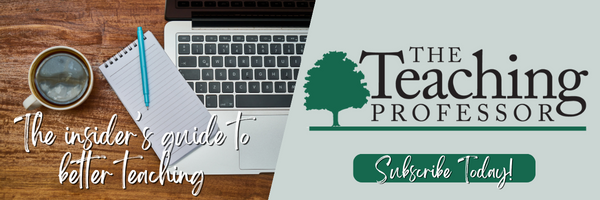This article first appeared in The Teaching Professor on July 17, 2017 © Magna Publications. All rights reserved.
If it’s a teacher’s advice on how to succeed, consider not giving it. Instead, challenge students to discover what it will take for them to do well.
If you haven’t stopped reading, here’s the issue: How much teacher advice do students follow? Yes, some take the recommended actions and do very well, but how many students is that?
Unfortunately, advice from teachers delivered with conviction and authority has three strikes against it before we even get to the actual recommendations. To beginning college students, advice from teachers sounds a lot like advice from parents, and if you have young adult children, you know firsthand how well that advice is received. Second, students have to be wondering what middle-aged (and beyond) teachers know about being a student. It’s been years since they were students, and times have changed. Third, the advice discredits what new students have thought about and decided for themselves. They know college is going to be harder and they have decided they’ll study harder. They know what they need to do, and they don’t appreciate being told by someone who thinks they know better.
Then there’s the advice itself. To students it sounds like what teachers are supposed to say: Do the reading before every class. That’s what they were told in high school, and it wasn’t necessary in most classes. Come to class every day. Well, most days, but probably not the Monday after a big weekend. Don’t use devices during class. Really? They can be checked discretely at the same time you’re listening to what’s going on in class.
Rather than telling students what to do, teachers should challenge students to find out what they don’t know and test what they think they do know. “I think you need to read the text if you want to do well in this course, but that’s something you need to find out for yourself. What could you do to find that out if this is a course where knowing what’s in the text means a better grade?” “Students in this course do better if they turn in a first draft of the paper and get feedback before turning in the final version. Should you do that? You can find out. We have three papers due in this course, all with the option of getting feedback first.”
Generally, students don’t turn to the teacher first for advice about a course, the homework, and the difficulty of the exams; they ask other students. What if teachers encouraged students to talk to peers but then helped them identify the questions they need to ask: “If you’re going to ask another student about the homework, what should you ask them? Maybe before that, who should you ask?” “Do students always tell each other the truth about courses?” “When’s the best time to ask other students questions about a course?”
There’s one final fact about teacher advice: students find out that some of it is not true. They do test out what teachers tell them, although not always with explicit intent. They show up in class unprepared when they have been advised (or told, more often) not to. The first time they feel guilty and a bit nervous. They sit in the back and when the teacher asks a question, they don’t make eye contact. But if the teacher talks about what’s important in the reading and asks questions that are easy to answer, well, maybe it’s not all that essential to come to this class prepared.
Do teachers abrogate a legitimate instructional responsibility if they don’t give students advice? Technically, when students are challenged to discover what they need to know, when they’re told they should figure out what it’s going to take for them to succeed in the course, that’s advice. And as illustrated in the comments above, teachers can still tell students what they should do—it’s just not presented as an authoritarian directive.
The challenge for teachers is discovering what to say and do that gets students taking the action that success in the course requires. How well does telling them what they should do accomplish that objective? Could there be a better way?




